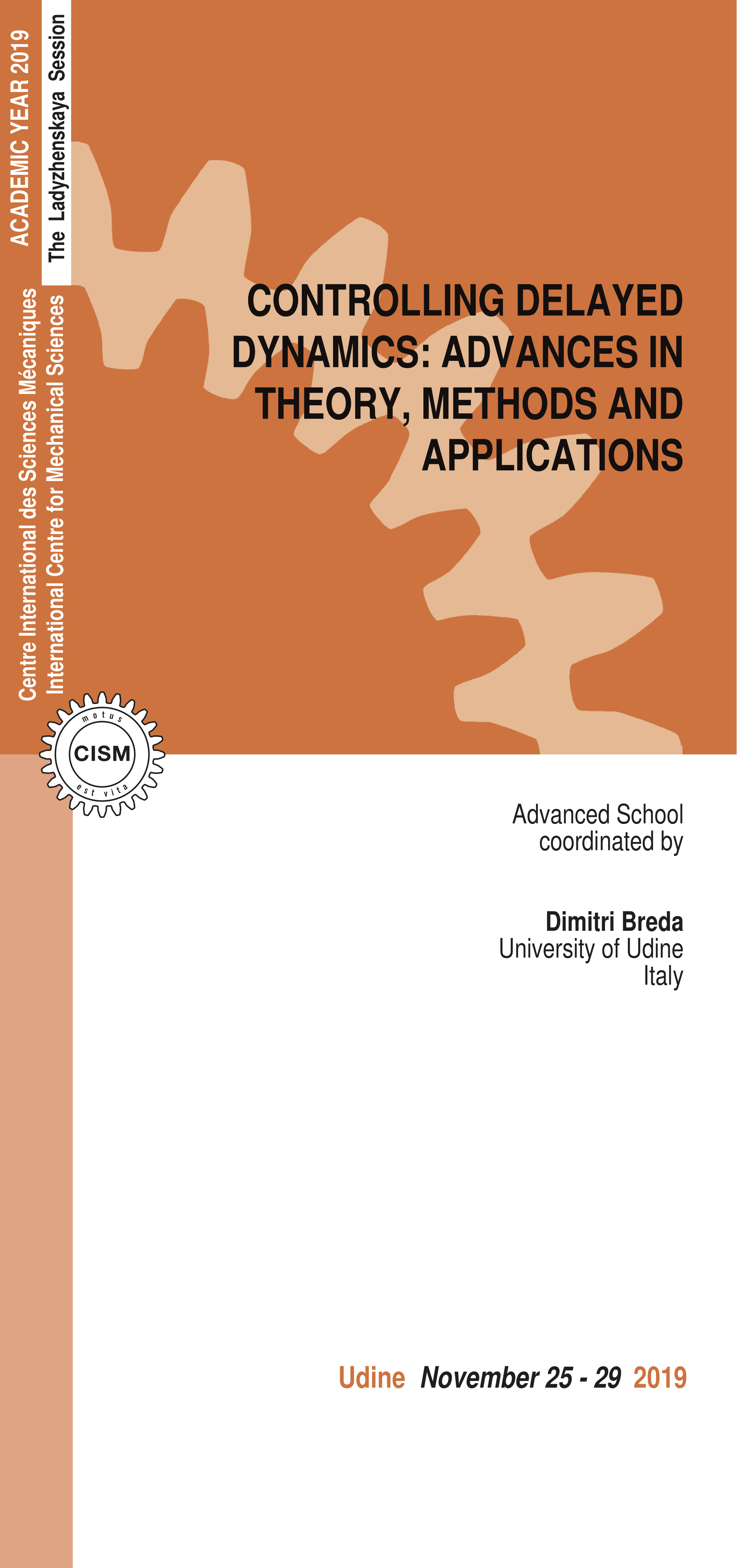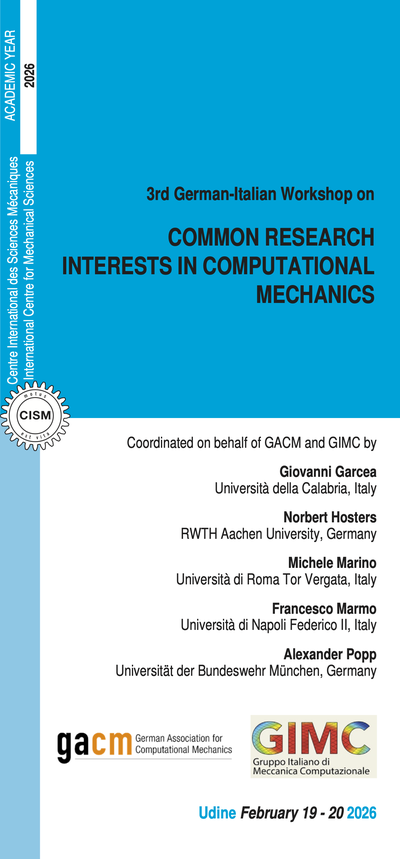Delays are ubiquitous in engineering and natural sciences, e.g., communication delays in control devices and complex networks or maturation and gestation delays in population dynamics. The inclusion of past history in the time evolution adds nontrivial complexities with respect to ordinary systems, balancing the advantage of dealing with more realistic models. Equations involving delays generate dynamical systems of infinite dimension, asking for advanced tools and methods in the background mathematical analysis, the numerical treatment, the development, design and optimization of control strategies. Eventually, the comprehension of fundamental issues like stability of equilibria and other invariants is crucial, especially for varying or uncertain parameters.
The school brings together strong and up-to-date contributions in the field of time delay systems, concerning analytical, numerical and application aspects, under the paradigm of control theory. It aims at discussing the most recent advances in these different contexts, focusing also on their interdisciplinary connections. Analysis, methods, control strategies and applications will be illustrated, starting from rapid introductions of the basics, reaching a state-of-the-art level by evolving the classic approaches into modern perspectives.
Attention will be devoted to the framework of semigroups, leading to a proper theory of linearized stability, where characteristic equations and Laplace transforms will be discussed for the sake of asymptotic analysis. An overview will thus be offered on efficient discretization schemes to reduce the dimension of the stability question, focusing on reliable and fast converging techniques. In parallel, the influence of model and control parameters on delayed dynamics will be investigated and characterized efficiently via continuation methods.
Moreover, the design problem for time-delay plants will be adequately addressed. Indeed, delays are crucial elements of engineering systems, e.g., regenerative delays in machine tool vibrations, leading often to unpredictable dynamics. Stabilization in the presence of feedback delay and sensory uncertainties is a challenging task and different control concepts will be discussed, together with an overview of limitations induced by delays in control loops. Recent control methodologies will be introduced, such as direct optimization approaches for synthesizing controllers. Concerning parameters, studying bifurcations of linear systems requires attention to the location of the rightmost roots, for which Weierstrass-based algorithms and frequency-sweeping tests will be proposed. Besides the design of controllers, considered the detrimental effects of delays in the plant model or in the feedback loops, the “dual problem” of intentionally using the delays in control law in order to improve the system behavior will be addressed. Also model reduction for large-scale systems will be discussed.
The school is primarily addressed to PhD students and post-docs in the fields connected to dynamical systems involving time delays and their control theory and numerical analysis, ranging from mathematics to engineering and physics. The lectures are also suited for young and senior researchers in the above or neighboring fields, from academia or private R&D centers, interested in gaining a compact yet comprehensive overview of dynamical systems with delay, from their mathematical background to control and computation.
Breda D., Maset S. and Vermiglio R., Stability of linear delay differential equations – A numerical approach with MATLAB. SpringerBriefs in Control, Automation and Robotics, Springer, 2015.
Diekmann O., van Gils S., Verduyn Lunel S.M. and Walther H.-O., Delay Equations – Functional, Complex and Nonlinear Analysis, Springer-Verlag, 1995.
Insperger T. and Milton J., Sensory uncertainty and stick balancing at the fingertip, Biol. Cybern., 108(1), pp. 85-101, 2014.
Insperger T. and Stépán G., Semi-discretization for time-delay systems – Stability and Engineering applications, Springer, 2011.
Li X.-G., Niculescu S.-I. and Cela A., Analytic Curve Frequency-Sweeping Stability Tests for Systems with Commensurate Delays, SpringerBriefs in Control, Automation and Robotics, Springer, 2015.
Michiels W., Control of linear systems with delays, Encyclopedia of Systems and Control, Springer-Verlag, pp. 167-173, 2015.
Michiels W. and Niculescu S.-I., Stability, control, and computation for time-delay systems. An eigenvalue based approach, SIAM, 2014.
Sieber J., Kuznetsov Y. and Engelborghs K., DDE-BIFTOOL; http://sourceforge.net/projects/ddebiftool/
Sipahi R., Niculescu S.-I., Abdallah C., Michiels W. and Gu K., Stability and stabilization of systems with time delay, IEEE Control Syst. Mag., 31(1), 38-65, 2011.
Stépán G., Delay effects in the human sensory system during balancing, Philos. Trans. R. Soc. London, Ser. A, 367, pp. 1195-1212, 2009.
Stépán G., Retarded dynamical systems: stability and characteristic functions, Longman Scientific & Technical, 1989.
Stépán G., Milton J.G. and Insperger T., Quantization improves stabilization of dynamical systems with delayed feedback, Chaos: An Interdisciplinary Journal of Nonlinear Science, 27, 114306, 2017.
Szalai R. and Roose D., Continuation and bifurcation analysis of delay differential equations, in Krauskopf B., Osinga H.M. and Galan-Vioque J. (Eds.), Numerical Continuation Methods for Dynamical Systems: Path following and boundary value problems, Springer-Verlag, 2007, pp. 359-399.
5 lectures on: Aim, scope and structure of the course; pseudospectral discretization methods for the stability analysis of time delay systems; numerical approximation of characteristic roots, multipliers and exponents; convergence analysis and implementation issues; applications to structured populations and consumer-resource dynamics.
6 lectures on: Regenerative delays in machine tool vibrations; unpredictable dynamics in engineering applications and human balancing models; stabilization in the presence of feedback delay and sensory uncertainties; time-periodic (clock-driven), nonlinear (event-driven), predictors feedback or fractional-order controllers.
6 lectures on: Introduction to numerical bifurcation analysis; numerical continuation and tracking of steady-states and periodic solutions; recent advances for continuation and bifurcation of delay differential equations; applications to Pyragas control, laser systems and climate modeling.
6 lectures on: Control design problem for time-delay plants; delays as control parameters; spectrum based techniques and time-domain methods; direct optimization approach for designing structured controllers; applications to engineering case studies; model reduction problem.
6 lectures on: Location of rightmost roots and poles assignment; imaginary crossing of spectral values; multiplicity of crossing roots; Weierstrass-based algorithms and frequency-sweeping tests; classification of singularities; applications to networked control systems, biochemical networks and vibration control.
6 lectures on: Delay equations as dynamical systems on a state-space of functions; continuous functions and strongly continuous semigroups; Borel functions and Stieltjes-Pettis integral; norming dual pair of spaces and twin semigroups; variation-of-constants formula and linearized stability; characteristic equations and Laplace transforms for asymptotic analysis.
The registration fee is 600.00 Euro + VAT*, where applicable (bank charges are not included). The registration fee includes a complimentary bag, four fixed menu buffet lunches (on Friday upon request), hot beverages, downloadable lecture notes and wi-fi internet access.
Applicants must apply at least one month before the beginning of the course. Application forms should be sent on-line through the following web site: http://www.cism.it. A message of confirmation will be sent to accepted participants. Applicants requiring assistance with the registration should contact the secretariat at the following email address cism@cism.it.
Applicants may cancel their course registration and receive a full refund by notifying CISM Secretariat in writing (by email to cism@cism.it) no later than two weeks prior to the start of the course.
Cancellation requests received during the two weeks prior to the start of the course will be charged a 50.00 Euro handling fee. Incorrect payments are also subject to a 50.00 Euro handling fee.
A limited number of participants from universities and research centres who are not supported by their own institutions can be offered lodging and/or board, if available, in a reasonably priced hotel or student guest house.
Requests should be sent to CISM Secretariat by September 25, 2019 along with the applicant's curriculum and a letter of recommendation by the head of the department or a supervisor confirming that the institute cannot provide funding. Preference will be given to applicants from countries that sponsor CISM.
Information about travel and accommodation is available on the web site www.cism.it, or can be mailed upon request.
* Italian VAT is 22%.





